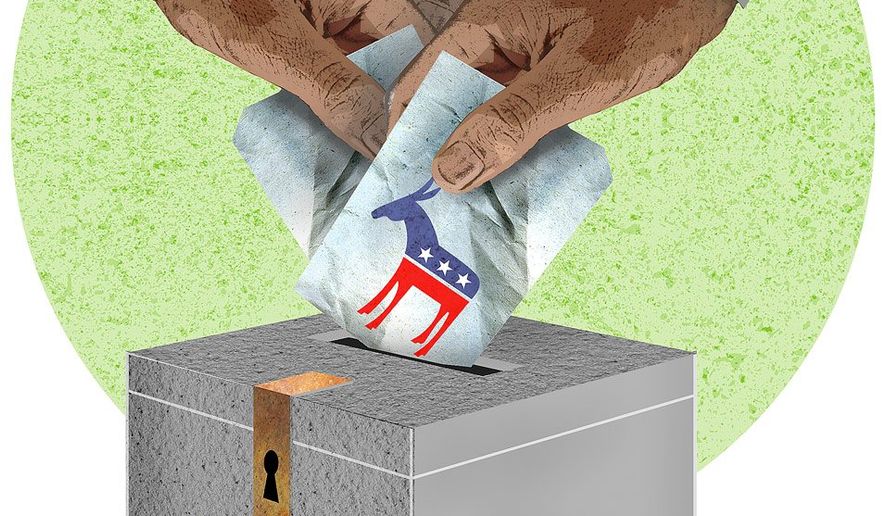OPINION:
Here in the Swamp, local Democrats are rattling the cage for statehood. They want to make the 61.4-square-mile District of Columbia the 51st state, right up there with Virginia, Alaska and California. Even the smallest state, Rhode Island, has 1,212 square miles, about half the size of Joe Biden’s Delaware.
Politically speaking, statehood is not going to happen. Washington, D.C., is unique by design. And, the rest of the nation, or at least half of it, wouldn’t be keen on adding two more guaranteed socialists to the U.S. Senate and another to the House. Congress is already full of them.
Before we take that plunge, let’s briefly look at some legislation put forth by the District’s Democrat-run city council as a guide to where they would help take the nation.
D.C. Council member David Grosso has reintroduced a bill to “decriminalize sex work.” For the unhip, that means legalizing prostitution, not the porcine goings-on under the big white dome, which are already more or less legal.
Despite a wealth of data and common sense showing that prostitution goes hand-in-glove with sexual trafficking, the bill “makes clear that coercion, exploitation and human trafficking are not tolerated in the District,” reports The Washington Times. Glad that’s settled.
Mr. Grosso’s law would create a task force to study how criminal penalties affect “sex workers” and to improve their “rights” and, of course, “public health.”
Well, under those circumstances, who wouldn’t want their mothers, sisters, wives and daughters out there turning tricks with multiple partners? There must be a study out there from the Kinsey Institute claiming to prove how selling one’s body is a wholesome, life-affirming experience with few risks.
In 2010, the council’s legalization of same-sex “marriage” forced Catholic Charities to close its foster care and adoption services rather than violate their faith by placing children in homosexual households.
More recently, council member Brandon Todd hatched a statute providing free, taxpayer-funded bus rides in all eight city wards. Mr. Todd says this will help alleviate several social ills, including climate change, traffic congestion and income inequality. He stopped just short of claiming that it would bring about peace in the Middle East.
Council member Robert White is sponsoring a law allowing incarcerated felons to vote. He notes that “there is no provision in the [U.S.] Constitution removing the right to vote for people who have committed felonies. And those who have been convicted do not lose their constitutional protections.” But they sure do lose their ability to run out and get some burritos at Taco Bell. Or hit a Taco Bell.
Mr. White’s not even talking about restoring the vote to felons who have served their time and completed parole. It’s for cons still behind bars for everything from grand theft to murder and rape.
Democrats are very supportive of felon voting, especially where it can swing an election. This almost certainly happened in Minnesota’s U.S. Senate race in 2008, when Al Franken’s amazing vote production team came up with enough ballots to put him over the top after several recounts. Mr. Franken won by only 312 votes, and hundreds of felons voted illegally. Since felons tend to vote for those who, like them, take what’s not theirs, it’s doubtful the majority of them voted for incumbent Republican Sen. Norm Coleman instead of Mr. “Grabby Fingers” Franken.
The above examples of wacky policy are just the tip of the iceberg in D.C., a one-party city where 91 percent voted for Hillary Clinton in 2016, with only 4 percent voting for Donald Trump.
Two years before that, 65 percent of D.C. voters approved a measure legalizing recreational use of marijuana, which went into effect in February 2015. Pot is still illegal under federal law and it’s illegal to sell it under D.C. law, but activists are working hard to get full legalization.
The bad news is that making weed mostly legal does not seem to have improved public health (D.C. still has twice the HIV infection rate as the rest of the nation) or resulted in more clear thinking. There do seem to be more food trucks than ever, however.
If D.C. somehow gets statehood, it could use its congressional clout to enhance its own economic wellbeing. As the seat of national government, where trillions flow in like water from the rest of the country, D.C. already has the highest median income ($82,372) and lots of pricey restaurants. It is a wonderful city in many ways, with universities, national monuments and world-class museums.
Washington, D.C.’s federal lands take up 18 square miles, or 29 percent of the District. Unfortunately, along with some posh, heavily wooded residential wards, D.C. also has areas with a high rate of unwed births, dependency and a persistently violent subculture.
In socialist countries and many Democrat-run American cities, wealthy elites often bump up against grinding poverty in urban areas, with a decreasing middle class.
Washington is no Venezuela, but if Nicolas Maduro ever gets driven out of his own miserable socialist country, perhaps he could sneak over the border, reinvent himself and run for D.C. Council.
• Robert Knight is a contributor to The Washington Times.




Please read our comment policy before commenting.